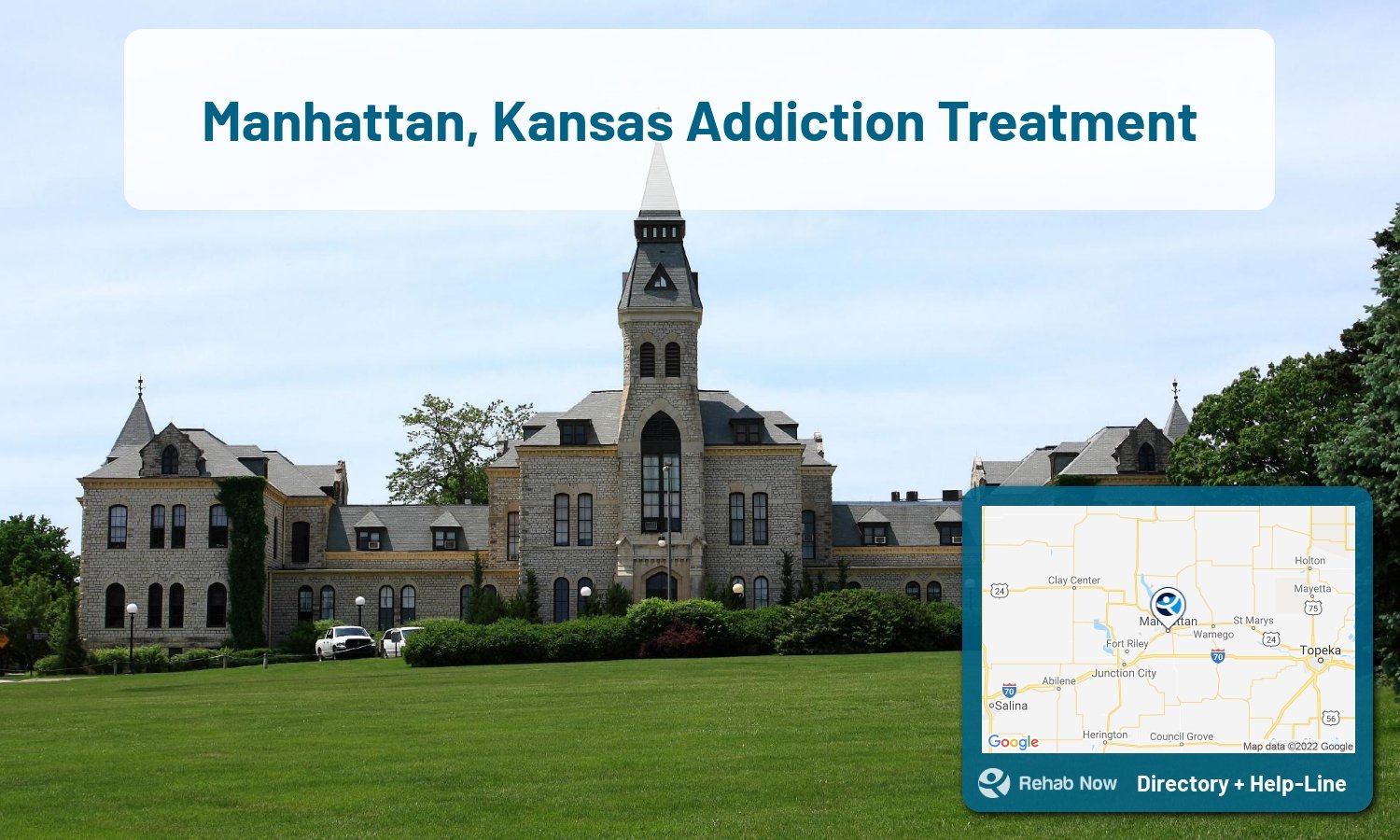Manhattan, Kansas Drug & Alcohol Rehab Centers
Manhattan, Kansas has a high drug addiction and abuse problem. According to recent statistics, about 9% of the population in Manhattan struggles with drug addiction or abuse problems. Some of the most commonly abused drugs in Manhattan include prescription painkillers, marijuana, and methamphetamine. In addition, alcohol is the most abused drug in the state.
The high rates of addiction and abuse have negative consequences for individuals, families, and communities. Drug addiction and abuse can lead to criminal activity, job loss, financial instability, and serious health problems. If you or someone you know is struggling with drug addiction or abuse problem, it is important to seek help.
We’re highlighting many of the best facilities and centers for addiction rehab here, all of them with their own special qualities. With a variety of opioid and alcohol rehabilitation services operating right in Kansas, there is opportunity for treatment and a better life.
Free Kansas Addiction Admissions Hot-Line
We will help you find treatment based on your location, budget, and specific needs and help you get started safely.
Free + Confidential Consultation
Browse 6 Centers in Manhattan, Kansas
Pawnee Mental Health Services - Manhattan offers mental health and substance abuse treatment using various therapy methods, specializing in dual diagnosis and accepts private health insurance for affordable and accessible care.
Pawnee Mental Health Services - Hayes Drive in Manhattan, Kansas offers mental health services, including addiction and substance abuse treatment programs, in a safe and welcoming environment for individuals facing various challenges.


Healthy Recovery Options provides personalized, evidence-based treatment plans which incorporate therapeutic modalities such as cognitive behavioral therapy and psychoeducation, as well as 24/7 medical support, medication management, holistic activities, and group support sessions to help individuals achieve a successful recovery from substance abuse.
Restoration Center Manhattan is a rural residential treatment center in Kansas that offers evidence-based substance abuse treatment, individualized services, and comprehensive aftercare to promote long-term sobriety.
Restoration Center - Manhattan is a fully licensed and accredited substance abuse and addiction treatment center in Manhattan, Kansas, that offers compassionate and evidence-based treatment, personalized treatment plans, aftercare services, and alternative therapies such as yoga and music therapy.
Pawnee Mental Health Services - Manhattan provides comprehensive mental health and addiction treatment services using evidence-based practices and a patient-centered approach, and is licensed and accredited by nationally recognized organizations.
Drug and Alcohol Treatment in Manhattan, KS
Fortunately, there are many resources available in Manhattan for people who need help getting sober. There are several excellent drug treatment facilities in the area that can provide comprehensive care for individuals struggling with addiction or abuse.

What Types of Treatment Are Available in Manhattan, Kansas?
There are many different types of drug treatment available in Manhattan, Kansas. Some common treatment options include inpatient and outpatient treatment, 12-step programs, and holistic approaches.
Inpatient treatment is a residential program where you live at the facility while you receive treatment. This is a good option for people who need around-the-clock care and supervision.
Outpatient treatment is a program where you go to the facility for treatment but then return home afterward. This is a good option for people who have jobs or children they need to take care of.
12-step programs are support groups that can be helpful for people in recovery.
Holistic approaches include therapies like yoga and meditation that can be helpful for people recovering from addiction.
Drug Abuse Statistics in Manhattan, Kansas
In the last decade, there were 574 drug overdose deaths in Manhattan, Kansas. Of those overdose deaths, 332 were due to opioids (including prescription opioids and heroin), which is 59.2% of the total drug overdose deaths. The rate of opioid-related deaths in Manhattan increased by 49% from 2007 to 2017.
Most people who abuse drugs are not seeking treatment. In fact, in 2016 only 9% of people who needed addiction treatment received it. The majority of drug treatment admissions in Manhattan are for cocaine (27%), marijuana (6%), and methamphetamine (21%).
- From 1999 to 2017, the rate of drug abuse in Manhattan increased by 163%.
- In 2016, 18% of high school students reported using marijuana in the past month.
- About 41% of people who abuse drugs continuously for a year or more reported having at least one mental health disorder.
- 21% of people who abuse drugs also abuse alcohol.
Additional Treatment Centers in Kansas
About 42% of adults in Kansas have tried an illicit drug at some point in their lives. 12.4% of the state population uses illegal drugs and 4.5% abuse alcohol in a given year. 15.16% of all deaths in Kansas between 2008 and 2017 were caused by either drugs or alcohol.
Still haven't found the right recovery center? Browse nearby Kansas cities.
- Holton, KS (47.7 mi.)
- Shawnee, KS (99.5 mi.)
- Louisburg, KS (108.5 mi.)
- Seneca, KS (51.4 mi.)
- Winfield, KS (137.4 mi.)
- Neodesha, KS (131.8 mi.)
- Yates Center, KS (101.3 mi.)
- Atchison, KS (80.8 mi.)
- Pratt, KS (159.7 mi.)
- Shawnee Mission, KS (99.5 mi.)
- Abilene, KS (40.2 mi.)
- Kingman, KS (136.4 mi.)
- Wichita, KS (73)
- Topeka, KS (32)
- Shawnee, KS (28)
- Shawnee Mission, KS (22)
- Kansas City, KS (21)
- Olathe, KS (21)
- Lawrence, KS (16)
- Salina, KS (12)
What Kind of Treatment Have Fast Result?
The best drug treatment for someone will vary depending on their individual situation and unique needs. However, some of the most effective drug treatments are often combination medication-assisted therapy (MAT) with behavioral therapies.
MAT involves the use of medications, such as buprenorphine or methadone, to help people overcome addiction. These medications work by reducing cravings and preventing withdrawal symptoms, making it easier for people to stick with treatment.
Behavioral therapies involve counseling and other interventions to help people understand and address the root causes of their addiction. These therapies can help people learn how to cope with cravings, avoid relapse, and build healthy relationships.
What is the Length of Stay?
Drug addiction is a chronic disease that requires ongoing treatment and support in order to be successful. Recovery is not a one-time event; it’s something that needs to be worked on continuously throughout one’s life.
The length of stay in drug treatment can vary based on a number of factors, including the type of drug, the severity of the addiction, and the individual’s personal circumstances.
In general, most people undergo treatment for about 28 days. However, some people may need to stay in treatment for 90 days or longer to get the most benefit.
If someone is struggling with a severe addiction or has multiple addictions, they may need longer-term treatment in order to achieve and maintain sobriety.
What are the Costs Involved?
The cost of drug treatment can vary depending on the type of drug treatment and the length of time it is used. Some common costs associated with drug treatment include:
- medical appointments
- medications
- hospital stays
- travel expenses to and from appointments
- laboratory tests
- addiction counseling
In general, drug treatment can be expensive. There are a few ways to reduce the cost of drug treatment, including private health insurance, Medicaid, and Medicare.
Some government assistance programs and charitable organizations also offer assistance with the cost of drug treatment.
Grant and Scholarship Opportunities
There are a few different options when it comes to scholarships and grants for drug addiction treatment. The first place to look is the Substance Abuse and Mental Health Services Administration website, which has a comprehensive list of both private and public funding opportunities. SAMHSA also provides information on how to apply for these scholarships and grants, as well as how to find other scholarships and grants that may be specific to your situation or location.
Another option is the National Institute on Drug Abuse, which offers a variety of funding options for both undergraduate and graduate students. There are also many private foundations that offer funding for drug addiction treatment, such as the Betty Ford Foundation or the Phoenix House Foundation.
What are the Success Rates?
The success rates for drug treatment vary depending on the type of treatment and the individual’s circumstances. However, in general, drug treatment is successful in helping people overcome addiction and achieve sobriety.
According to the National Institute on Drug Abuse, about 40-60% of people who receive treatment for addiction are able to remain sober one year after completing treatment.
This number increases to 60-80% after five years.
There are many things that can affect a person’s success in drug rehab, including their level of commitment, the type of program they choose, and the severity of their addiction. However, with the right combination of factors, most people can overcome their addiction with help from a professional drug rehab program.
What Happens If I Relapse After Completing Treatment?
If you relapse after completing treatment, it is important to seek help immediately. Relapse is often a sign that a person’s recovery is not going well and that additional help is needed. Treatment for addiction can be effective, but it is not always easy. There are many factors that can lead to a relapse, so it is important to understand the risks and take steps to prevent relapse.
Some of the risks factors for relapse include:
- Social pressure to use drugs or alcohol
- Negative emotions such as anger, anxiety, or depression
- Stressful life events
- Exposure to cues associated with drug or alcohol use
- Lack of support from family or friends
It is important to have a strong support system in place to help you stay sober after completing treatment. This includes having a support group or sponsor, talking to friends and family about your addiction, and avoiding situations that may lead to relapse.
Manhattan, KS Treatment Centers. Find drug rehab in Manhattan, Kansas, or detox and treatment programs. Get the right help now! (888) 674-0062.





